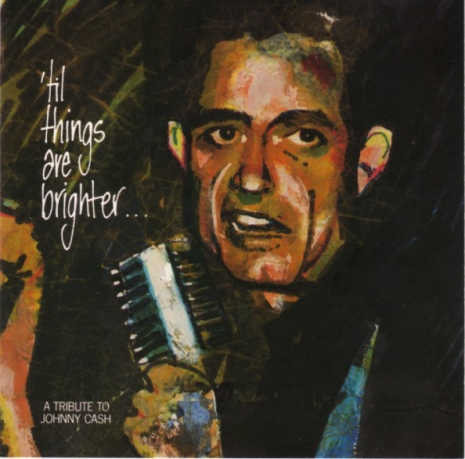
Last night I saw a concert by Billy Bragg, whose socialistic music and entire socialistic steez has taken on new ultra-relevance in an era in which Donald Trump is the President of the United States of America. Bragg was suitably fired up, and you can be sure he whipped the audience at Cleveland’s Music Box Supper Club into a righteous frenzy before the night was out.
Opening was the venerable Jon Langford of the Mekons, and he told an amusing story from the stage involving Johnny Cash. The starting point was the ‘Til Things Are Brighter project, which Langford and former Fall member and later BBC deejay Marc Riley spearheaded as a way to pay homage to Cash. This was the late 1980s—seven years after Cash was nearly killed by an ostrich in 1981—and Cash’s stock was at a relative nadir. As Langford explained, Cash was a bit dejected because it looked for all the world like his productive career was over and he had little to look forward to beyond a lengthy dotage and an inevitable slide to obscurity.
The roster of musicians is rather eye-popping. The album opens with Michelle Shocked, whose breakthrough album Short Sharp Shocked came out the same year, doing “One Piece At A Time.” Pete Shelley of the Buzzcocks covered “Straight A’s In Love” while Cabaret Voltaire‘s Steven Mallinder took on “I Walk the Line.” The Triffids’ David McComb gave “Country Boy” his best while Langford’s Mekons and Riley played “Folsom Prison Blues” and “Wanted Man,” respectively.
All thirteen backing tracks were recorded by Langford and Riley and their house band in one day at RikRak Studio in Leeds, and the vocal tracks were picked up as various opportunities arose over the next several weeks. As the Guardian’s Graeme Thomson wrote in 2011,
Langford recalls that Marc Almond, the one “proper” pop star taking part, came in and “told me I’d cut “Man in Black” in the wrong key. He had a horrible fit in the studio. Sally [Timms, from the Mekons] talked him down and coaxed this fantastic performance out of him, but I think he was a bit nervous. It was maybe a bit odd for him to be doing Johnny Cash songs.”
Odd perhaps, but Timms did some good work there—Almond’s vocal track is arguably the best thing on the album.
One of Langford and Riley’s clever ideas was to have Mary Mary, the (male) singer of the Grebo band Gaye Bykers on Acid execute a cover of Cash’s classic song “A Boy Named Sue.” They were concerned that Cash might not be enthusiastic being covered by anybody associated with a band of that name, but not a bit of it, he was totally open to it and found the idea entirely amusing. Cash was touched that his music was so adored by a younger generation of musicians and also had no issue whatsoever with the fact that the comp would raise money for AIDS research—it’s easy to forget now, but at that time AIDS was regarded as an exclusively gay issue, and some prominent people did in fact shy away from the associations. The man in black was proud of the compilation and talked it up in an interview on BBC radio.
You can hear some snippets of that interview, actually taped in 1989, at the outset of this upload of the full album on YouTube:
Previously on Dangerous Minds:
‘Hello, I’m Johnny Cash’: The 1976 Christian comic book
How Johnny Cash was nearly killed by an ostrich in 1981